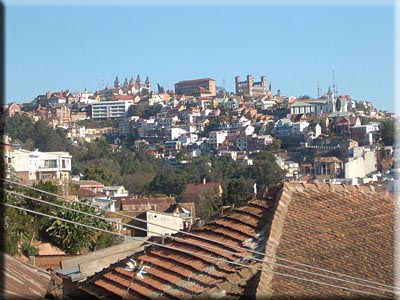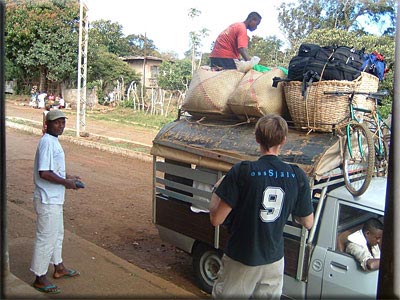The people of Madagascar
by Jonas Persson
Reading the guidebook I learned that Malagasy people were very friendly and always with a smile, but arriving in Antananarivo (Tana) I discovered otherwise. People looked stern and did not return my friendly smiles or greetings. It perplexed me. The only time I got to have any kind of interaction was when I had to say no to beggars and salesmen of rubber stamps along the streets, and in those cases a simple no gave me a persistent companion for at least 50 meters.
In search of an explanation, I blamed tourists, such as myself, for robbing the Malagasy people of their smiles. Greed and jealousy follow the rich man’s path- sigh. My conscience was filled with guilt and my confused mind in search for answers. What are my responsibilities towards the people here? What can I do to help? To be able to move on, Katie and I decided on a few ground rules.
1.We were not giving money to begging children. Children should not be encouraged to beg, they should be encouraged to go to school.
2.We can give food, but not money, to elderly beggars, to make sure our aid is not used to buy alcohol.
3.We do not haggle for prices in the market or in the street, but pay what is asked. We can afford it. (This rule, we discovered later, we were forced to alter.)
4.We were, before we left the country, going to search out a good, on-site aid organization, and donate $50 to it.
Leaving Tana was a relief. Once outside the big city, people’s attitudes changed. Sure, there was still the occasional attempt to rip us off. In Tamatave I was forced to pay $5 dollar for a 500-meter pousse-pousse ride, which should have been 50 cents. When the driver tried to take another $4 from me I angrily took it back and scowled at him. In Ranohira two guys tricked us for two hours to wait for a taxi-brousse on the wrong side of the street, only so that they, once the taxi-brousse came on the side we had first been waiting on, could make it look like they helped us and charge an additional 29% (I calculated in post-anger) service fee. After that, Katie and I vowed to get tougher.
However, the average Malagasy proved to be both generous and honest. Though, communications, perhaps, has been our greatest challenge. (Knowing some French would certainly have helped a great deal, and I enviously observed French-speaking people joke and laugh with the Malagasy. On our own part, we picked up a few friendly phrases in Malagasy, and in French we learned how to ask for a room, ask if they served food and if we could please get the bill. To agree on a price, we were dependent on pen and paper.) The people have been  patient, friendly and helpful. In Ramena I was invited to play soccer on the beach with the local youths. In Fianarantsoa our hotel was run by a Malagasy family, which made us feel right at home as they came to knock on our door asking if we wanted dinner, and, afterwards, offered us to sit down and have a drink while telling us their family history while we showed pictures from Sweden and America. In Fianarantsoa we were also approached by school children wanting to practice their already impressive English. After talking to them for a while we decided to buy each one of them (two boys and four girls) a notepad to further encourage their efforts in school. Their beaming faces as they received their notepads felt very rewarding. At the food market we have, more than once, had people track us down through the small, maze-like paths between stalls and stalls of fruits and rice, only to give back the $1 change as we, unknowingly, had overpaid. In taxi-brousses, people smile and laugh, practice their English with us and try to teach us new words in Malagasy. In Ranomafana, we went to a village celebration with dancing and food, and were instantly part of the opening ring dance. In Ifaty, sitting by the road waiting for a taxi-brousse to come by, we started playing tic-tac-toe and were soon surrounded by twenty or thirty children, all smiling shy smiles, joining us in our game, and writing their names down in Katie’s journal.
patient, friendly and helpful. In Ramena I was invited to play soccer on the beach with the local youths. In Fianarantsoa our hotel was run by a Malagasy family, which made us feel right at home as they came to knock on our door asking if we wanted dinner, and, afterwards, offered us to sit down and have a drink while telling us their family history while we showed pictures from Sweden and America. In Fianarantsoa we were also approached by school children wanting to practice their already impressive English. After talking to them for a while we decided to buy each one of them (two boys and four girls) a notepad to further encourage their efforts in school. Their beaming faces as they received their notepads felt very rewarding. At the food market we have, more than once, had people track us down through the small, maze-like paths between stalls and stalls of fruits and rice, only to give back the $1 change as we, unknowingly, had overpaid. In taxi-brousses, people smile and laugh, practice their English with us and try to teach us new words in Malagasy. In Ranomafana, we went to a village celebration with dancing and food, and were instantly part of the opening ring dance. In Ifaty, sitting by the road waiting for a taxi-brousse to come by, we started playing tic-tac-toe and were soon surrounded by twenty or thirty children, all smiling shy smiles, joining us in our game, and writing their names down in Katie’s journal.
In conclusion, the people of Madagascar are friendly, generous and honest. Let’s just hope they stay that way and that the tourist impact won’t have a negative effect on once smiling faces.
Article & Images Copyright © Jonas Persson 2005